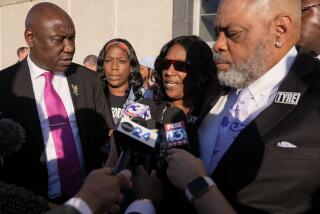Evidence Against Nichols Called ‘Great’ : Courts: Judge who denied bail to accused bombing suspect also doubts his alibi. His ruling is first judicial review of government’s case.
- Share via
OKLAHOMA CITY — A U.S. District judge on Tuesday characterized accused Oklahoma City bombing conspirator Terry L. Nichols as an enemy of the federal government and said that the weight of evidence against him is “heavy” and “great.”
In a written order following up on his decision last week to deny bail for Nichols, Judge David L. Russell also went through the government’s case against the 40-year-old Army veteran, point by point.
Russell expressed strong doubts about Nichols’ alibi and ruled that there is “extensive circumstantial evidence” that he played a central role in the April 19 bombing of the Alfred P. Murrah Federal Building here.
The judge’s findings, while early in the process and not subjected to the rigors of cross-examination at a trial, are noteworthy nonetheless because they provide the first judicial review of the preliminary evidence against Nichols.
The judge seemed particularly irked by Nichols’ apparently deep hatred for the U.S. government. “The very nature of the offense with which the defendant is charged raises a strong inference of animosity toward the federal government,” the judge said in the 17-page order.
Noting that Nichols has renounced his citizenship, collected anti-government literature and tapes and stockpiled 33 firearms throughout his home and garage, the judge said:
“The defendant’s history of possession of tools of violence all point to a clear and serious risk of danger to the community, particularly the community of federal employees, that would be posed by his release.”
The unusually lengthy and harsh comments from the judge will complicate the task of Nichols’ defense attorneys as they turn to the U.S. 10th Circuit Court of Appeals in Denver to try again to win their client’s release on bail.
Russell, however, also took action stemming from concerns that he had expressed last week about allegations that the government had pressured Nichols emotionally by holding his wife against her will and then subjected him to psychological evaluations whose true purpose was to question him outside the presence of his attorneys.
Russell has made it clear that he plans to investigate whether the government acted improperly. On Tuesday, he ordered that all government “records, notes and memoranda of any psychiatric or psychological evaluations or interviews” of Nichols be turned over to his court for review.
Attorneys for Nichols, while conceding that he has been friends with fellow defendant Timothy J. McVeigh, have insisted that he was not involved in the bombing and can account for his activities in the days leading up to and after the April 19 explosion.
But Russell, in pointing to the government’s evidence against Nichols, found otherwise.
“There is extensive circumstantial evidence that the defendant at least aided or abetted others in the commission of the offense,” the judge said. “The weight of such circumstantial evidence against the defendant is heavy.”
The judge noted that Nichols has no criminal record, no history of drug or alcohol abuse, and that he voluntarily turned himself in to police in Herington, Kan., where he owns a home, after learning that his name had surfaced in the bombing investigation.
But he also said that Nichols moved frequently from state to state, toured gun shows, used aliases, disclaimed his allegiance to the U.S. government and collected firearms.
That, coupled with evidence that Nichols is an expert on assembling fertilizer bombs like the one used here, was enough to convince the judge that Nichols was involved in some way.
Said the judge: “There is not only probable cause to believe that the defendant committed or aided and abetted the commission of the most devastating bombing--in terms of loss of lives--in the peacetime history of this country, but the weight of the evidence that he committed that offense is great.”
And he put little stock in Nichols’ argument that he was at home in Herington when the bomb went off and therefore was not involved.
“Defendant’s evidence of his whereabouts and innocent activities immediately preceding the bombing in Oklahoma City does little in the way of providing an alibi,” the judge wrote.
More to Read
Sign up for Essential California
The most important California stories and recommendations in your inbox every morning.
You may occasionally receive promotional content from the Los Angeles Times.











